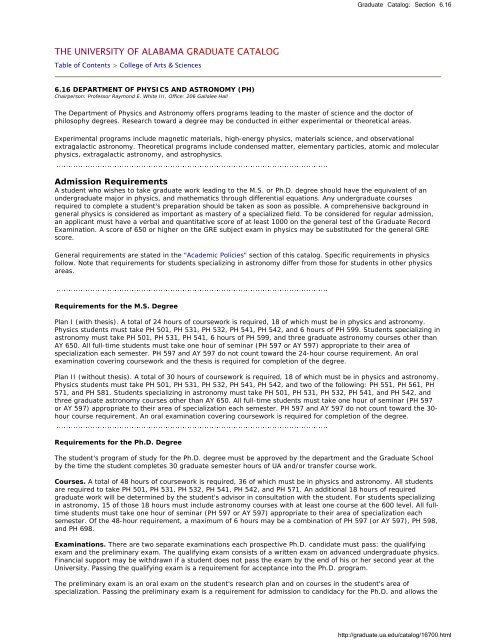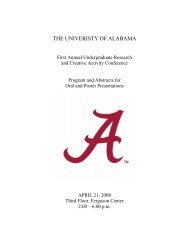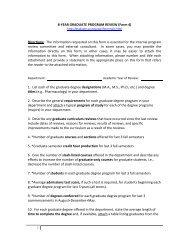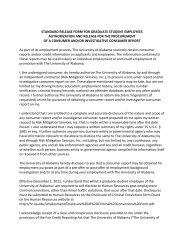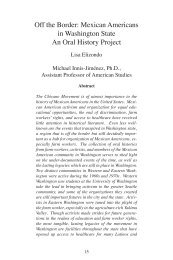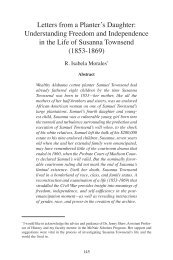- Page 1 and 2:
http://graduate.ua.edu/catalog/This
- Page 3:
Graduate Catalog: Index4.6 Scholast
- Page 7 and 8:
Graduate Catalog: Section 2.1http:/
- Page 9 and 10:
Graduate Catalog: Section 2.3http:/
- Page 11 and 12:
Graduate Council Membershttp://grad
- Page 13:
Graduate Catalog: Section 2.7http:/
- Page 16 and 17:
Graduate Catalog: Section 3.3http:/
- Page 18 and 19:
Graduate Catalog: Section 3.5http:/
- Page 20 and 21:
Graduate Catalog: Section 3.7http:/
- Page 22 and 23:
Graduate Catalog: Section 3.8http:/
- Page 24 and 25:
Graduate Catalog: Section 3.9http:/
- Page 26 and 27:
Graduate Catalog: Section 3.9http:/
- Page 28 and 29:
Graduate Catalog: Section 3.9http:/
- Page 30:
Graduate Catalog: Section 3.9http:/
- Page 33 and 34:
Graduate Catalog: Section 3.9http:/
- Page 35 and 36:
Graduate Catalog: Section 3.9http:/
- Page 37 and 38:
Graduate Catalog: Section 3.9http:/
- Page 39 and 40:
Graduate Catalog: Section 3.10http:
- Page 41 and 42:
Graduate Catalog: Section 3.12http:
- Page 43 and 44:
Graduate Catalog: Section 3.14http:
- Page 45 and 46:
Graduate Catalog: Section3.16http:/
- Page 47 and 48:
Graduate Catalog: Section 3.18http:
- Page 49 and 50:
Graduate Catalog: Section 3.19http:
- Page 51 and 52:
Graduate Catalog: Section 3.20http:
- Page 53 and 54:
Graduate Catalog: Section 3.20http:
- Page 55 and 56:
Graduate Catalog: Section 3.21http:
- Page 57 and 58:
Graduate Catalog: Section 4.1http:/
- Page 59 and 60:
Graduate Catalog: Section 4.3http:/
- Page 61 and 62:
Graduate Catalog: Section 4.4http:/
- Page 63 and 64:
Graduate Catalog: Section 4.4http:/
- Page 65 and 66:
Graduate Catalog: Section 4.4http:/
- Page 67 and 68:
Graduate Catalog: Section 4.4http:/
- Page 69 and 70:
Graduate Catalog: Section 4.5http:/
- Page 71 and 72:
Graduate Catalog: Section 4.5http:/
- Page 73 and 74:
Graduate Catalog: Section 4.6http:/
- Page 75 and 76:
Graduate Catalog: Section 4.8http:/
- Page 77 and 78:
Graduate Catalog: Section 4.9http:/
- Page 79 and 80:
Graduate Catalog: Section 4.9http:/
- Page 81 and 82:
Graduate Catalog: Section 4.9http:/
- Page 83 and 84:
Graduate Catalog: Section 4.9http:/
- Page 85 and 86:
Graduate Catalog: Section 4.9http:/
- Page 87 and 88:
Graduate Catalog: Section 4.10http:
- Page 89 and 90:
Graduate Catalog: Section 6.1http:/
- Page 91 and 92:
Graduate Catalog: Section 6.1http:/
- Page 93 and 94:
Graduate Catalog: Section 6.2http:/
- Page 95 and 96:
Graduate Catalog: Section 6.2http:/
- Page 97 and 98:
Graduate Catalog: Section 6.2http:/
- Page 99 and 100:
Graduate Catalog: Section 6.3http:/
- Page 101 and 102:
Graduate Catalog: Section 6.3http:/
- Page 103 and 104:
Graduate Catalog: Section 6.4http:/
- Page 105 and 106:
Graduate Catalog: Section 6.4http:/
- Page 107 and 108:
Graduate Catalog: Section 6.4http:/
- Page 109 and 110:
Graduate Catalog: Section 6.5http:/
- Page 111 and 112:
Graduate Catalog: Section 6.5http:/
- Page 113 and 114:
Graduate Catalog: Section 6.6http:/
- Page 115 and 116:
Graduate Catalog: Section 6.7http:/
- Page 117 and 118: Graduate Catalog: Section 6.8http:/
- Page 119 and 120: Graduate Catalog: Section 6.8http:/
- Page 121 and 122: Graduate Catalog: Section 6.8http:/
- Page 123 and 124: Graduate Catalog: Section 6.8http:/
- Page 125 and 126: Graduate Catalog: Section 6.8http:/
- Page 127 and 128: Graduate Catalog: Section 6.9http:/
- Page 129 and 130: Graduate Catalog: Section 6.9http:/
- Page 131 and 132: Graduate Catalog: Section 6.10http:
- Page 133 and 134: Graduate Catalog: Section 6.10http:
- Page 135 and 136: Graduate Catalog: Section 6.11http:
- Page 137 and 138: Graduate Catalog: Section 6.11http:
- Page 139 and 140: Graduate Catalog: Section 6.11http:
- Page 141 and 142: Graduate Catalog: Section 6.12http:
- Page 143 and 144: Graduate Catalog: Section 6.12http:
- Page 145 and 146: Graduate Catalog: Section 6.13http:
- Page 147 and 148: Graduate Catalog: Section 6.13http:
- Page 149 and 150: Graduate Catalog: Section 6.13http:
- Page 151 and 152: Graduate Catalog: Section 6.14http:
- Page 153 and 154: Graduate Catalog: Section 6.14http:
- Page 155 and 156: Graduate Catalog: Section 6.14http:
- Page 157 and 158: Graduate Catalog: Section 6.14http:
- Page 159 and 160: Graduate Catalog: Section 6.14http:
- Page 161 and 162: Graduate Catalog: Section 6.15http:
- Page 163 and 164: Graduate Catalog: Section 6.15http:
- Page 165 and 166: Graduate Catalog: Section 6.15http:
- Page 167: Graduate Catalog: Section 6.15http:
- Page 171 and 172: Graduate Catalog: Section 6.16http:
- Page 173 and 174: Graduate Catalog: Section 6.17http:
- Page 175 and 176: Graduate Catalog: Section 6.17http:
- Page 177 and 178: Graduate Catalog: Section 6.17http:
- Page 179 and 180: Graduate Catalog: Section 6.18http:
- Page 181 and 182: Graduate Catalog: Section 6.18http:
- Page 183 and 184: Graduate Catalog: Section 6.19http:
- Page 185 and 186: Graduate Catalog: Section 6.19http:
- Page 187 and 188: Graduate Catalog: Section 6.19http:
- Page 189 and 190: Graduate Catalog: Section 6.20WS 52
- Page 191 and 192: Graduate Catalog: Section 7.2http:/
- Page 193 and 194: Graduate Catalog: Section 7.3http:/
- Page 195 and 196: Graduate Catalog: Section 7.3http:/
- Page 197 and 198: Graduate Catalog: Section 7.4.4http
- Page 199 and 200: Graduate Catalog: Section 7.4.5http
- Page 201 and 202: Graduate Catalog: Section 7.4.6http
- Page 203 and 204: Graduate Catalog: Section 7.4.8http
- Page 205 and 206: Graduate Catalog: Section 7.4.9http
- Page 207 and 208: Graduate Catalog: Section 7.4.10htt
- Page 209 and 210: Graduate Catalog: Section 7.4.11htt
- Page 211 and 212: Graduate Catalog: Section 7.4.12THE
- Page 213 and 214: Graduate Catalog: Section 7.5http:/
- Page 215 and 216: Graduate Catalog: Section 7.5http:/
- Page 217 and 218: Graduate Catalog: Section 7.6.1http
- Page 219 and 220:
Graduate Catalog: Section 7.6.1http
- Page 221 and 222:
Graduate Catalog: Section 7.6.2http
- Page 223 and 224:
Graduate Catalog: Section 7.6.2http
- Page 225 and 226:
Graduate Catalog: Section 7.6.3http
- Page 227 and 228:
Graduate Catalog: Section 7.6.3http
- Page 229 and 230:
Graduate Catalog: Section 7.6.5http
- Page 231 and 232:
Graduate Catalog: Section 7.6.7http
- Page 233 and 234:
Graduate Catalog: Section 7.6.9THE
- Page 235 and 236:
Graduate Catalog: Section 7.6.10htt
- Page 237 and 238:
Graduate Catalog: Section 7.6.10htt
- Page 239 and 240:
Graduate Catalog: Section 7.6.11htt
- Page 241 and 242:
Graduate Catalog: Section 7.6.12htt
- Page 243 and 244:
Graduate Catalog: Section 7.6.12htt
- Page 245 and 246:
Graduate Catalog: Section 7.6.13htt
- Page 247 and 248:
Graduate Catalog: Section 7.6.13htt
- Page 249 and 250:
Graduate Catalog: Section 8.2http:/
- Page 251 and 252:
Graduate Catalog: Section 8.3http:/
- Page 253 and 254:
Graduate Catalog: Section 8.4http:/
- Page 255 and 256:
Graduate Catalog: Section 8.5http:/
- Page 257 and 258:
Graduate Catalog: Section 8.6http:/
- Page 259 and 260:
Graduate Catalog: Section 8.6http:/
- Page 261 and 262:
Graduate Catalog: Section 8.7http:/
- Page 263 and 264:
Graduate Catalog: Section 8.7http:/
- Page 265 and 266:
Graduate Catalog: Section 8.8http:/
- Page 267 and 268:
Graduate Catalog: Section 8.9http:/
- Page 269 and 270:
Graduate Catalog: Section 8.9http:/
- Page 271 and 272:
Graduate Catalog: Section 8.9http:/
- Page 273 and 274:
Graduate Catalog: Section 8.10.2htt
- Page 275 and 276:
Graduate Catalog: Section 8.10.3htt
- Page 277 and 278:
Graduate Catalog: Section 8.10.3htt
- Page 279 and 280:
Graduate Catalog: Section 8.10.4htt
- Page 281 and 282:
Graduate Catalog: Section 8.10.6htt
- Page 283 and 284:
Graduate Catalog: Section 8.10.6htt
- Page 285 and 286:
Graduate Catalog: Section 8.10.6htt
- Page 287 and 288:
Graduate Catalog: Section 8.10.8htt
- Page 289 and 290:
Graduate Catalog: Section 9.2http:/
- Page 291 and 292:
Graduate Catalog: Section 10.2http:
- Page 293 and 294:
Graduate Catalog: Section 10.2http:
- Page 295 and 296:
Graduate Catalog: Section 10.3http:
- Page 297 and 298:
Graduate Catalog: Section 10.5http:
- Page 299 and 300:
Graduate Catalog: Section 10.5http:
- Page 301 and 302:
Graduate Catalog: Section 10.6http:
- Page 303 and 304:
Graduate Catalog: Section 10.6http:
- Page 305 and 306:
Graduate Catalog: Section 10.6.1htt
- Page 307 and 308:
Graduate Catalog: Section 10.6.1htt
- Page 309 and 310:
Graduate Catalog: Section 10.6.1htt
- Page 311 and 312:
Graduate Catalog: Section 10.6.1htt
- Page 313 and 314:
Graduate Catalog: Section 10.7THE U
- Page 315 and 316:
Graduate Catalog: Section 10.7.1htt
- Page 317 and 318:
Graduate Catalog: Section 10.7.1htt
- Page 319 and 320:
Graduate Catalog: Section 10.7.1htt
- Page 321 and 322:
Graduate Catalog: Section 10.7.1htt
- Page 323 and 324:
Graduate Catalog: Section 10.8.1htt
- Page 325 and 326:
Graduate Catalog: Section 10.8.1htt
- Page 327 and 328:
Graduate Catalog: Section 10.8.2htt
- Page 329 and 330:
Graduate Catalog: Section 10.8.2htt
- Page 331 and 332:
Graduate Catalog: Section 10.8.2htt
- Page 333 and 334:
Graduate Catalog: Section 10.8.2htt
- Page 335 and 336:
Graduate Catalog: Section 10.9http:
- Page 337 and 338:
Graduate Catalog: Section 10.9http:
- Page 339 and 340:
Graduate Catalog: Section 10.9http:
- Page 341 and 342:
Graduate Catalog: Section 10.10http
- Page 343 and 344:
Graduate Catalog: Section 10.10http
- Page 345 and 346:
Graduate Catalog: Section 10.11http
- Page 347 and 348:
Graduate Catalog: Section 10.11http
- Page 349 and 350:
Graduate Catalog: Section 11.2http:
- Page 351 and 352:
Graduate Catalog: Section 11.3http:
- Page 353 and 354:
Graduate Catalog: Section 11.5http:
- Page 355 and 356:
Graduate Catalog: Section 11.6.1htt
- Page 357 and 358:
Graduate Catalog: Section 11.6.2THE
- Page 359 and 360:
Graduate Catalog: Section 11.6.2htt
- Page 361 and 362:
Graduate Catalog: Section 11.6.2htt
- Page 363 and 364:
Graduate Catalog: Section 11.6.2htt
- Page 365 and 366:
Graduate Catalog: Section 11.6.2htt
- Page 367 and 368:
Graduate Catalog: Section 11.6.3htt
- Page 369 and 370:
Graduate Catalog: Section 11.6.4THE
- Page 371 and 372:
Graduate Catalog: Section 11.6.4htt
- Page 373 and 374:
Graduate Catalog: Section 11.6.5htt
- Page 375 and 376:
Graduate Catalog: Section 11.6.5htt
- Page 377 and 378:
Graduate Catalog: Section 11.6.5htt
- Page 379 and 380:
Graduate Catalog: Section 11.6.6htt
- Page 381 and 382:
Graduate Catalog: Section 11.6.6htt
- Page 383 and 384:
Graduate Catalog: Section 11.6.6htt
- Page 385 and 386:
Graduate Catalog: Section 11.6.7htt
- Page 387 and 388:
Graduate Catalog: Section 11.6.7htt
- Page 389 and 390:
Graduate Catalog: Section 11.6.7htt
- Page 391 and 392:
Graduate Catalog: Section 11.6.7htt
- Page 393 and 394:
Graduate Catalog: Section 11.6.8htt
- Page 395 and 396:
Graduate Catalog: Section 11.6.8htt
- Page 397 and 398:
Graduate Catalog: Section 11.6.9htt
- Page 399 and 400:
Graduate Catalog: Section 11.6.9htt
- Page 401 and 402:
Graduate Catalog: Section 12.1http:
- Page 403 and 404:
Graduate Catalog: Section 12.1.1htt
- Page 405 and 406:
Graduate Catalog: Section 12.3.1htt
- Page 407 and 408:
Graduate Catalog: Section 12.3.2htt
- Page 409 and 410:
Graduate Catalog: Section 12.3.3htt
- Page 411 and 412:
Graduate Catalog: Section 12.3.4htt
- Page 413 and 414:
Graduate Catalog: Section 12.3.4htt
- Page 415 and 416:
Graduate Catalog: Section 12.3.5htt
- Page 417 and 418:
Graduate Catalog: Section 12.3.6htt
- Page 419 and 420:
Graduate Catalog: Section 13.1http:
- Page 421 and 422:
Graduate Catalog: Section 14.1http:
- Page 423 and 424:
Graduate Catalog: Section 14.1http:
- Page 425 and 426:
Graduate Catalog: Section 14.2http:
- Page 427 and 428:
Graduate Catalog: Section 14.3http:
- Page 429 and 430:
Graduate Catalog: Section 14.4http:
- Page 431 and 432:
Graduate Catalog: Section 14.4http:
- Page 433 and 434:
Graduate Catalog: Section 14.5http:
- Page 435 and 436:
Graduate Catalog: Section 14.6http:
- Page 437 and 438:
Graduate Catalog: Section 15.1http:
- Page 439 and 440:
Graduate Catalog: Section 15.1http:
- Page 441 and 442:
Graduate Catalog: Section 15.2http:
- Page 443 and 444:
Graduate Catalog: Section 15.2http:
- Page 445 and 446:
Graduate Catalog: Section 15.3http:
- Page 447 and 448:
Graduate Catalog: Section 15.3http:
- Page 449 and 450:
Graduate Catalog: Section 15.3http:
- Page 451 and 452:
Graduate Catalog: Section 15.4THE U
- Page 453 and 454:
Graduate Catalog: Section 15.4http:
- Page 455:
Graduate Catalog: Section 15.5http:


